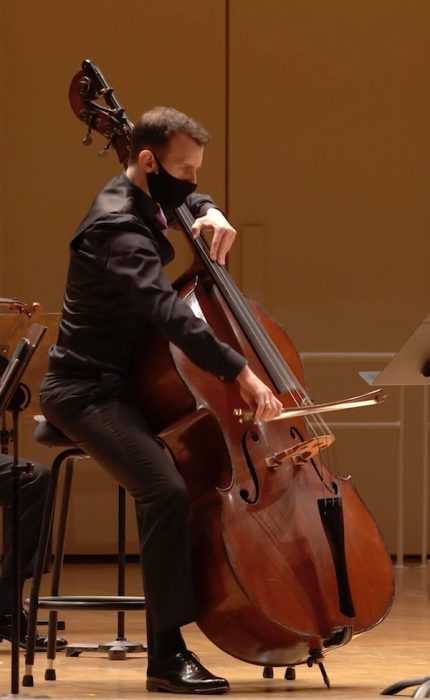Mazzoli’s brilliant bass concerto lights up MusicNOW stream

The cancellation of nearly all live classical music events around the world over the past 14 months has caused great angst for music aficionados. Among the local events lost to Covid-19 were Lyric Opera’s Ring cycle and Quatuor Diotima’s survey of the complete Bartok quartets and late Beethoven quartets at Mandel Hall.
Similarly regrettable was the pandemic’s de facto abridgment of Missy Mazzoli’s term as the Chicago Symphony Orchestra’s Mead composer in residence—losing effectively half of her three-year tenure. One did not get to hear any of Mazzoli’s music performed at CSO concerts (though her Orpheus Undone will receive its belated premiere next season). Also to be missed are her savvy programming and the efficient and engaging professionalism she displayed in curating MusicNOW concerts and serving as on-stage interlocutor.
Happily, there is some recompense to be had with Episode 21 of the streaming CSO Sessions series, released Thursday and available through July 9 on the orchestra’s CSOtv platform. Mazzoli’s penultimate MusicNOW program shows typical variety and discernment with three intriguing works–two by composers of color–in the 40-minute program.
First up was Delta Blues by Wadada Leo Smith. The work was written in the late 1990s but was being heard in its belated world premiere.
As the 79-year-composer and jazz trumpeter related in his introductory video, despite its title Smith’s five-minute piece doesn’t depict the Delta and has no blues in it. Rather, the composer states that the piece represents an image of the sun rising over the flat ground, and tries to capture its rays as they enrich and revitalize the land and the people.
Anyone expecting a sunny, picturesque jazz-flavored item would be pleasantly surprised by this gnarly and austere work. Scored for mixed quintet (violin, cello, flute, bass clarinet and piano), Delta Blues begins with sepulchral single bass notes in the piano. The music soon accelerates into faster music, with jagged, driving ostinati in the strings against a muttering bass clarinet. Yet an overall feeling of peace and repose prevails, reflected in the pointillist piano writing and the calming passage for flute and piano. Smith’s music received supreme advocacy from all, notably violinist Nancy Park, bass clarinetist John Bruce Yeh and pianist Winston Choi.
As shown in previous works heard in Chicago, Missy Mazzoli is the most consistent and gifted composer to hold the CSO’s composer in residence position since John Corigliano inaugurated the post in 1987.
That was made manifest once again in Mazzoli’s own Dark with Excessive Bright. The evocative title comes from Milton’s description of God’s raiment in Paradise Lost, yet the words, Mazzoli believes, nicely apotheosize the unique palette of the double-bass, which serves as solo protagonist in this work.
One of the most striking elements about Mazzoli’s music is how she builds on traditions of the past while bringing a decidedly 21st-century voice to those traditions in an effective, communicative and individual way.
That’s certainly true in this 13-minute double-bass concerto, which the composer says is inspired by the Baroque, the era’s spirit “dragged through the centuries.” The Baroque influences are there in a kind of postmodern style, particularly in the backing ensemble’s wrong-note concerto grosso idiom.
Yet Dark with Excessive Bright offers most strikingly a concise distillation of the big concerto with grand gestures, cantabile lyricism and even a show-offy cadenza. It’s as if a 19th-century solo showpiece were being viewed through a refracted mirror, captured with a stripped down, more acerbic style spiking the Romantic punch.
With Dark with Excessive Bright, Missy Mazzoli gives us the finest double-bass concerto of the past fifty years at least. One would have to go back to the Bass Concerto (1948) of the Estonian composer Eduard Tubin to find one of comparable quality and finish.
The composer deftly and resourcefully mines the expressive possibilities of this subterranean Leviathan of the orchestra, always making the instrument emerge clearly and make dramatic or lyrical impact as required in her surging, finely wrought piece.
Much of the success of this local premiere is due to the remarkable solo advocacy of Alexander Hanna. The CSO principal bass’s instrument sings, swoons, soars and swaggers, and Hanna finds a surprisingly wide range of coloring and expressive nuance, all captured superbly by the video and recording.
Conductor Edwin Outwater adroitly handled the tricky balancing between the soloist and 15-string ensemble, and Hanna’s colleagues provided him with close and sympathetic support.
The program concluded with the world premiere of Nicole Mitchell’s Cult of Electromagnetic Connectivity. In her spoken notes, the flutist and composer posits a fantastical scenario wherein beings from another dimension feed off the electromagnetic radiation from our cell phones, laptops and iPads, which send said beings into a frenzied dance.
Mitchell’s work begins with a menacing bass clarinet set against isolated single strokes from the bass drum, the latter growing louder, in a kind of malign duo. Soon the rest of the sextet enters, jumping in with extended solo passages or conversational pairs of instruments.
Mitchell’s piece is about as long as Mazzoli’s concerto, yet it doesn’t have her cohesion or the sense of a strong musical narrative sustaining it for the duration. Still, there are striking isolated moments: chains rattling on top of a bass drum, the metallic nattering of the bass clarinet against a churning cello, and a haunting passage near the coda for hushed flute, violin and high percussion.
Conductor Michael Lewanski of Dal Niente brought his usual focused and clarifying direction and there was superb playing by the six musicians, especially bass clarinetist Yeh and principal percussionist Cynthia Yeh.
This stream will be available online through July 9.
Episode 22 in the CSO Sessions series presents the final MusicNOW concert of the season on June 24. That program includes Gilda Lyons’ Bone Needles, Tomeka Reid’s Prospective Dwellers and the world premieres of Courtney Bryan’s Requiem and David Reminick’s “The Pub” from In Dreams. CSOtv.
Posted in Performances




